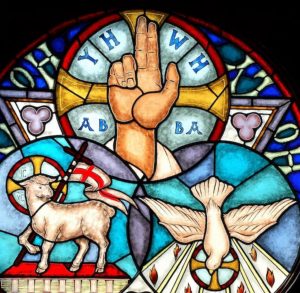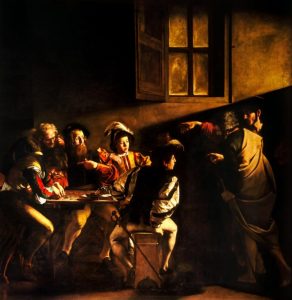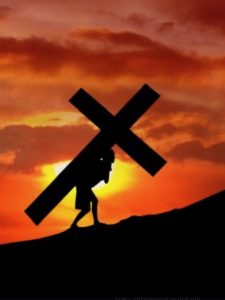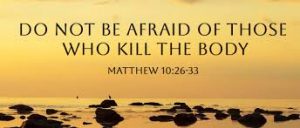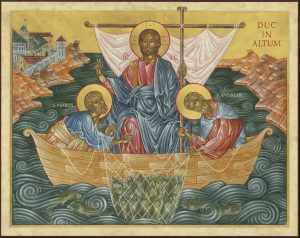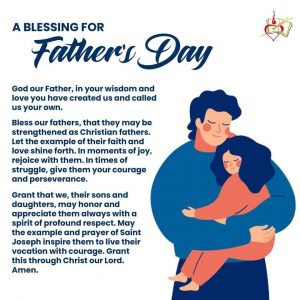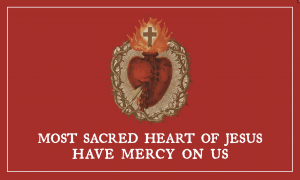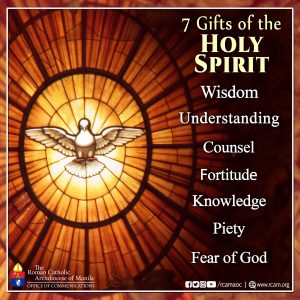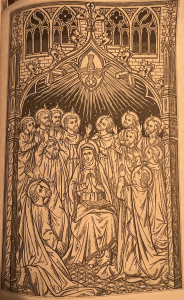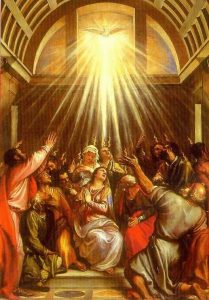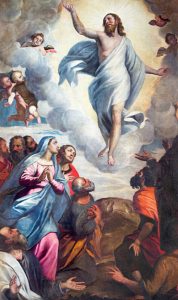I am anxiously waiting for my right eye surgery on June 6th. I have been blind in my right eye and in pain for several days. It affects my balance and visual perception during the celebration of the mass which causes great challenges relying only on one eye. Last Monday, May 29th, I had the opportunity to watch the movie entitled, “The Life of Pi.” It isn’t a recent movie, and yet it gave me beautiful profound insights and reflections that even in our human sufferings and trials, God is watching us. I believe that God is not just passively watching us but is genuinely involved in our journey of life. Oftentimes, God makes sure that He affirms His relationship with us.
Today is the Feast of the Holy Trinity, a relationship of three persons in one God. Every Feast-day of the Holy Trinity, I am always amazed with the thought and teachings of our father, St. Augustine, whom I consider to be the brilliant Father of the Western Church, clarifying doctrinal loopholes about the doctrine of the Holy Trinity during his time; thus he wrote his book De Trinitate.
There are two ways in which St. Augustine presents his thought:
First, St. Augustine’s mind is to communicate the simplest way to understand the Trinity ensuring that the three Persons are given equal greatness. He stated that the greatness of the Father and the greatness of the Holy Spirit are equally seen in the greatness of the Son. He reiterated that no person in the Trinity is greater than the other and cannot be separated from each other for they share the same divine essence, nature, and unity.
Second, he used the idea of love to explain the Trinity and its relationships of love in three persons: The Person that loves, the Person who is loved, and the Person who acts of love itself. In his book, St. Augustine says, “the Trinity does not work indivisibly, but the Father does some things, the Son other things, and the Holy Spirit yet others: or else, if they do some things together, some severally, then the Trinity is not indivisible. (De Trinitate 8:10).” Hence, the Trinity works together in divine unity and not indivisibly.
Maybe no human mind is ever able to present a much clearer explanation based on Augustine’s profound knowledge of sacred scriptures. St. Augustine emphasizes the Father as the Creator, the Son as the Redeemer and the Holy Spirit as the Wisdom, the giver of the knowledge of God. St. Augustine searches God, keeping his heart and mind understanding the mystery of God in his journey through life. We have seen the great work of St. Augustine wanting to help us be able to achieve our goal to search and find Him with the aid of the Holy Spirit. No one knows or loves the things of God except through receiving His Spirit’s guidance.
We are all aware that Holy Trinity cannot be found in the scriptures verbatim; however, it has been imperatively revealed in several passages in the bible which I would mention only two references, like the story on the baptism of Jesus in the river Jordan by John the Baptist and in Mathew 28:19-20, “Go and baptize them in the name of the Father, and of the Son and of the Holy Spirit.” It cannot be denied that the concept of the Holy Trinity could be found in the bible. I feel sorry for those religious denominations who fail to see the revelation of God in human history. How can they fathom to understand God when the human mind is insufficient to grasp when we focus only on the word “God” without considering the simple logic of revelation through the unfolding of Salvation History?
Let us take a look at the readings today which also add to our insight.
The first reading from the book of Exodus reveals an image of a loving, merciful, and gracious God to Moses. He is God who is slow in anger and rich in kindness and fidelity. This is what is St. Augustine’s established relationship of the three persons whom God reveals His true identity to Moses as a person who is loving. This conversation between God and Moses is indeed powerful to figure out that from the very beginning of God’s creation, He reveals His goodness and love.
The second reading, taken from the 2nd letter of St. Paul to the Corinthians, is to encourage all of us to live in unity as a community of Jesus Christ. As believers, we must be witnesses of God’s love and peace with no discord, no division, and live out the love of God by greeting each other with a holy kiss.
I remember a certain sect in the Philippines called “Iglesia ni Cristo,” as they want to be called, which was founded by Felix Manalo in 1914. This religious group is a modern heresy who outrightly denies the divinity of Jesus. I would say that they deny the Holy Trinity and succumbed to the idea that they follow Jesus as a man who taught them the true religion. They loved to quote a similar biblical text, today’s second reading but taken from Romans 16:16, in which if you refer to the many bible translations, it translates this way, “Greet one another with a holy kiss. All the churches of Christ greet you.” This heretical cult convinced their followers that with the name, “Church of Christ,” they claim that their church name has been mentioned in the bible, but poor followers of this cult are not critically questioning the basis of their claim. Based on the different bible translations, it has a plural form, meaning, different churches, like, in Thessalonica, Corinth, Roma, etc…referring to the different groups of people converting to the new established community of faith in Christ. How could this “Iglesia/Iglesia ni Manalo/ INC” be linked and be associated to the early Christians by its founder, Felix Manalo? This is absurd! Those existing churches as mentioned in the bible were established in the early 33 to 50 centuries, therefore, obviously not referring to this INC group which has celebrated their hundred years of existence under the guise of a true church. However, there is something good in them by helping one another, especially those who contribute much to the church, but outside their church, they cursed people. We must bear in mind that believing in God is not asking me to abandon my values and my beliefs to those whose faith is different from me, but to show every person the compassion and love I experience. This is exactly the message of St. Paul.
The gospel today is another exhortation of St. John 3:16-18 which disturbs me big time. He wrote, “God so loved the world that he gave his only Son, so that everyone who believes in him might not perish but might have eternal life.” This is the foundation of our faith. We were baptized in the Holy Trinity to gain eternal life and to experience and understand that God loves us, in the first place. Out of this love, the Father sends His Son’s amazing miracle thru His ministry. He offered Himself for our redemption, died and He rose again. How could I ever deny the existing presence of the Trinity in order to appreciate and believe in this greatest manifestation of love which I need also to share as a member of Christ’s Church here on earth. How could I be wrong to accept this doctrine of the Holy Church and the teaching of our Lord?
The Holy Spirit gives knowledge, understanding, counsel and other spiritual gifts. Jesus led us to the Father, for He is the Way, the Truth, and the Life (John 14:6). Just as we are created by God, who is love, we too are being called to establish a love-relationship with the Trinity.
We have questions about the very nature of God and we think we can solve the mystery of God in a mathematical equation or science driving our human mind to figure it out. Instead of frustration, we must be attracted to God’s divine love. We belong to God; we just need to manifest His great love.
God bless you.
Fr. Arlon, osa
—————————-
El Dictado del Corazón: La Santísima Trinidad
- Éxodo 34:4b-6, 8-9 (Salmo responsorial)
- Daniel 3:52, 53, 54, 55, 56
- 2 Corintios 13:11-13
- Juan 3:16-18
Espero ansiosamente mi cirugía del ojo derecho que es el seis de Junio. He estado ciego del ojo derecho y tuve dolor durante varios días, afecta mi equilibrio y la percepción visual durante la celebración de la misa, lo que genera un gran desafío al depender solo de un ojo. El pasado lunes veintiocho de mayo tuve la oportunidad de ver la película titulada “La vida de Pi”, no es una película reciente y sin embargo me brindó hermosas y profundas reflexiones de que aún en nuestros sufrimientos y pruebas humanas, Dios nos está mirando. Creo que Dios no solo nos observa pasivamente, sino que está genuinamente involucrado en nuestro viaje de la vida. A menudo, Dios se asegura de afirmar Su relación con nosotros.
Hoy es la Fiesta de la Santísima Trinidad, una relación de tres personas en un solo Dios. Cada fiesta de la Santísima Trinidad me sorprende el pensamiento y las enseñanzas de San Agustín, a quien considero genial de la Iglesia en la cristiandad occidental, aclarando lagunas doctrinales sobre la doctrina de la Santísima Trinidad durante su tiempo, así escribió su libro De Trinitate.
Hay dos formas en que San Agustín presenta su pensamiento:
Primero, la mente de San Agustín es comunicar la forma más simple de entender la Trinidad asegurando que las tres Personas reciban la misma grandeza. Afirmó que la grandeza del Padre y la grandeza del Espíritu Santo se ven igualmente en la grandeza del Hijo. Reiteró que ninguna persona en la Trinidad es más grande que otra y no pueden separarse el uno del otro, porque comparten la misma esencia, naturaleza y unidad divina.
En segundo lugar, utilizó la idea del amor para explicar la Trinidad y sus relaciones de amor en tres personas: la Persona que ama, la Persona que es amada y la Persona que actúa por amor mismo. En su libro, San Agustín dice: “La Trinidad no obra indivisiblemente, sino que el Padre hace unas cosas, el Hijo otras, y el Espíritu Santo otras aún; o bien, si hacen unas cosas juntos, otras por separado, entonces la Trinidad no es indivisible. (De Trinitate 8:10).” Por lo tanto, la Trinidad trabaja junta en unidad divina y no indivisible.
Tal vez ninguna mente humana sea capaz de presentar una explicación mucho más clara basada en el profundo conocimiento de las Sagradas Escrituras como San Agustin. San Agustín enfatiza al Padre como Creador, al Hijo como Redentor y al Espíritu Santo como Sabiduría, dador del conocimiento de Dios. San Agustín busca a Dios, manteniendo su corazón y su mente comprendiendo el misterio de Dios en su camino por la vida. Hemos visto la gran obra de San Agustín queriendo ayudarnos a lograr nuestro objetivo de buscarlo y encontrarlo con la ayuda del Espíritu Santo. Nadie conoce o ama las cosas de Dios excepto al recibir la guía de Su Espíritu.
Todos somos conscientes de que la Santísima Trinidad no se puede encontrar en las escrituras palabra por palabra, sin embargo, se ha revelado de manera imperativa en varios pasajes de la Biblia, de los cuales mencionaría solo dos referencias, como la historia de los bautismos de Jesús en el río Jordán por Juan el Bautista y en Mateo veintiocho: diecinueve-veinte, “Id y bautizar en el nombre del Padre y del Hijo y del Espíritu Santo”. No se puede negar que el concepto de la Santísima Trinidad se puede encontrar en la Biblia. Lo siento por aquellas denominaciones religiosas que no vieron la revelación de Dios en la historia humana. ¿Cómo pueden captar o comprender a Dios cuando la mente humana es insuficiente para comprender cuando nos enfocamos solo en la palabra “Dios” sin considerar la lógica simple de la revelación a través del desarrollo de la Historia de la Salvación?
Veamos las lecturas de hoy que también se suman a nuestra percepción.
La primera lectura del libro del Éxodo revela a Moisés una imagen de un Dios amoroso, misericordioso y lleno de gracia. Es un dios lento en la ira y rico en bondad y fidelidad. Esta es la relación establecida por San Agustín de las tres personas a las que Dios revela su verdadera identidad a Moisés como una persona que ama. Esta conversación entre Dios y Moisés es realmente hermosa, para darse cuenta de que desde el comienzo mismo de la creación de Dios, Él revela Su bondad y amor.
La segunda lectura tomada de la segunda carta de San Pablo a los Corintios es para animarnos a todos a vivir en unidad como comunidad de Jesucristo, como creyentes, debemos ser testigos del amor y la paz de Dios. Sin discordia, sin división y viviendo el amor de Dios saludándonos con un beso santo.
Recuerdo que cierta secta en Filipinas llamada “Iglesia ni Cristo quieren llamarse fundada por Félix Manalo en 1914. Este grupo religioso es una herejía moderna que niega rotundamente la divinidad de Jesús. Diría que niegan la Santísima Trinidad y sucumbieron a la idea de que siguen a Jesús como un hombre que les enseñó la verdadera religión. Les encanta citar un texto bíblico similar de la sección de hoy en la segunda lectura, pero tomada de Romanos dieciséis: dieciséis, en la que si te refieres a las muchas traducciones de la Biblia, se traduce de esta manera, “Saluden unos a otros con ósculo santo. Todas las iglesias de Cristo se saludan”. Este culto herético convenció a sus seguidores de que cuando el nombre, “Iglesia de Cristo”, afirman que el nombre de su iglesia ha sido mencionado en la Biblia, pero los pobres seguidores de este culto no cuestionan críticamente la base de su afirmación. Basado en las diferentes traducciones de la Biblia, tiene una forma plural, es decir, diferentes iglesias, como Tesalónica, Corinto, Roma, etc., refiriéndose a los diferentes grupos de personas que se convierten a la comunidad de fe en Cristo recién establecida. ¿Cómo pudo vincularse y asociarse esta “Iglesia/ Iglesia ni Manalo/ INC” con los primeros cristianos por parte de su fundador, Félix Manalo? ¡Esto es absurdo! Esas iglesias existentes como se mencionó fueron fundadas a principios del siglo 33o 50, patético porque este grupo ha celebrado sus cien años de existencia bajo la apariencia de una iglesia verdadera. Sin embargo, hay algo bueno en ayudarse unos a otros, especialmente aquellos que aportan mucho a la iglesia, pero fuera de su iglesia, maldecían a la gente. Debemos tener en cuenta que creer en Dios no es pedirme que abandone mis valores y mis creencias a aquellos cuya fe es diferente a la mía sino mostrar a cada persona la compasión y el amor que experimento. Este es exactamente el mensaje de San Pablo.
El evangelio de hoy es otra exhortación de San Juan tres:dieciséis-dieciocho. Escribió: “Tanto amó Dios al mundo que dio a su Hijo único para que todo el que crea en él no se pierda, sino que tenga vida eterna”. Este es el fundamento de nuestra fe. Fuimos bautizados en la Santísima Trinidad para obtener la vida eterna y para experimentar y comprender que Dios nos ama, en primer lugar. Por este amor, el Padre envía el asombroso milagro de Su Hijo a través de Su ministerio, Él se ofreció a sí mismo por nuestra redención, murió y resucitó. ¿Cómo podría negar la presencia existente de la Trinidad para apreciar y creer en esta manifestación más grande de amor que también necesito compartir como miembro de la Iglesia de Cristo aquí en la tierra? ¿Cómo podría equivocarme al aceptar esta doctrina de la Santa Iglesia y la enseñanza de nuestro Señor?
El Espíritu Santo da conocimiento, entendimiento, consejo y otros dones espirituales. Jesús nos condujo al Padre, porque Él es el Camino, la Verdad y la Vida (Juan catorce:seis).
Así como somos creados por Dios, que es amor, también nosotros estamos llamados a establecer una relación de amor con la Santísima Trinidad.
Tenemos preguntas sobre la naturaleza misma de Dios y pensamos que podemos resolver el misterio de Dios en una ecuación matemática o ciencia que impulsa nuestra mente humana a resolverlo, en lugar de frustrarnos, debemos sentirnos atraídos por el amor divino de Dios. Pertenecemos a Dios, solo tenemos que manifestar su gran amor.
Dios lo bendiga.
Padre Arlón, osa
